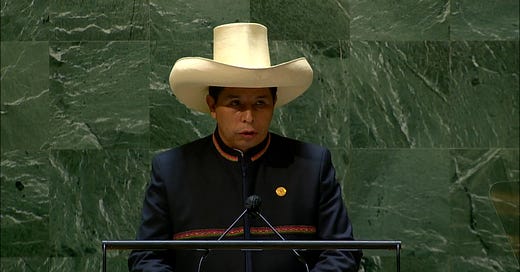Peru's new leftist president at UN: Healthcare, education, housing, jobs are rights, must be guaranteed to all
In his first United Nations address, Peru's President Pedro Castillo called for a "social transformation" that guarantees "economic rights," while reducing hunger, poverty, and inequality
Peru’s new leftist President Pedro Castillo delivered his first address to the United Nations General Assembly on September 21.
He used the platform to call for a “social transformation” that guarantees not just civil and political rights, but also economic and social rights to healthcare, education, housing, and dignified work.
“Health, education, water, and sanitation cannot be for-profit business; they are fundamental human rights that we must guarantee,” Castillo emphasized.
Noting that he is the first rural school teacher to ever lead Peru, Castillo stressed the need to eliminate extreme poverty and hunger, while reducing poverty and inequality.
He also prioritized protecting the environment, and said his government is going to declare a “climate emergency.”
Notably, there was a major issue completely absent from his speech: Castillo very clearly steered away from international affairs, and did not comment on any conflicts in Latin America.
His government’s foreign policy has been quite inconsistent, and Castillo’s anti-imperialist foreign minister, Héctor Béjar, was forced by the military to resign, mere weeks after being appointed.
Béjar warned the forced resignation was “a soft coup, or the beginning of it.” He added, ominously, “Castillo is an excellent person,” but “this is a weak government; I am not going to deny it.”
There are a lot of internal contradictions in Castillo’s government, and it is not very stable. The right-wing opposition still dominates many Peruvian state institutions, including the Congress, and is committed to impeaching him as soon as possible.
Castillo is also leading a country that has had five presidents in just five years, including three different heads of state in one chaotic week.
Nevertheless, his address at the UN gives us a glimpse into the social issues Castillo is prioritizing in his new government.
I translated some highlights of the Peruvian president’s speech below.

“A social transformation is needed, which allows all Peruvians to enjoy their economic and social rights, in addition to fundamental freedom to civil and political rights — a transformation that takes place in the homes of every family.”
“Their rights to education, to health, to honest work, to a dignified salary, to social security, to housing, and to access to an individual, economic, and collective life, while respecting the rights of Mother Earth.”
“It is the first time in the history of my Peruvian people that a school teacher from a rural area is leading this country.”
“And that responsibility obligates me to serve the poor, the marginalized, the vulnerable populations, the small businesses, the middle classes who have suffered through the pandemic, and of course, all Peruvians without exclusions.”
“Peru is the cradle of many great civilizations that have contributed to the history of humanity. It is a multicultural and multiethnic country.”
“My government is counting on building a society and a state with popular roots, with social inclusion, which eliminates inequalities, injustices, the unfair distribution of wealth, to build a solid democratic society in which freedom and civil rights are guaranteed by a democratic and representative state that inspires the participation of the population and the sub-national, regional, and local governments in all of the processes of decision-making that concern their futures and lives.”

“Health, education, access to water, and sanitation cannot be for-profit business. They are fundamental human rights that we must guarantee, assuring universal, high-quality access, without any kind of discrimination.”
“We are equally committed to a policy of social development that allows Peru to complete the goals of the millennium, especially concerning access to water, to health networks, reduction of poverty, elimination of extreme poverty, reduction of infant mortality, full access to the health system, guaranteeing inclusive high-quality education, attaining gender equality, and especially creating jobs and improving informal work. Dignified work is the only long-lasting antidote against poverty.”
“The goal of zero hunger must be what the international community focuses its resources on. It is imperative to double our actions to meet the immediate food needs of all vulnerable populations, to strengthen programs of social protection, to maintain and increase global trade of food.”
“A new social contract is being built in Peru, a new social contract that assures democratic governance with peace and social cohesion, and that is able to drastically reduce poverty and eliminate extreme poverty, that reduces inequalities and ends exclusion and racism as obstacles to equal treatment by the state and the market.”





